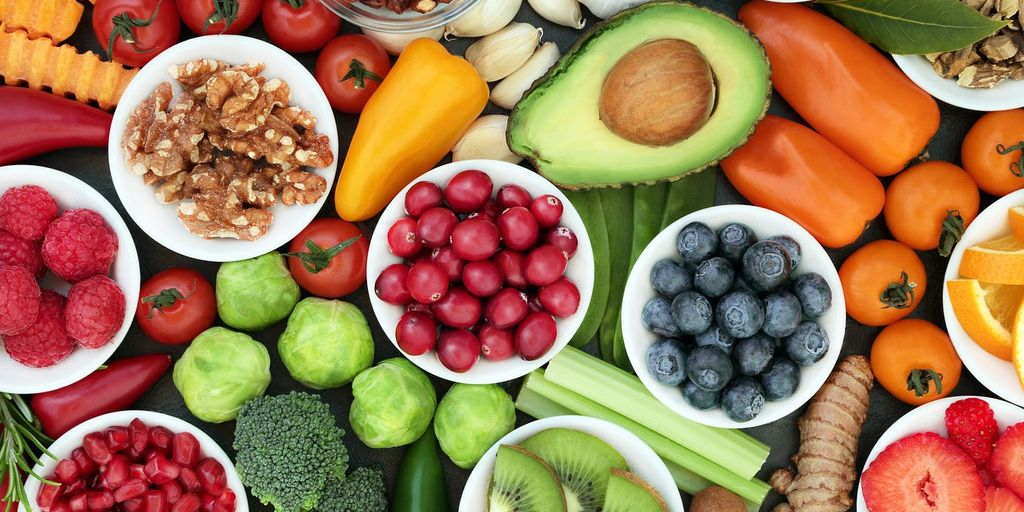
In today’s busy world, staying healthy is more important than ever. What we eat plays a big role in how we feel and how healthy we are. Good nutrition helps us stay strong, feel energetic, and avoid getting sick. This article will explore how eating the right foods can make a huge difference in our lives.
Key Takeaways
- Eating a variety of colorful fruits and vegetables can boost your immune system.
- Balanced meals with proteins, carbs, and fats are essential for energy and well-being.
- Vitamins and minerals are crucial for many body functions and overall health.
- Good nutrition can improve your mood and help manage stress.
- Staying hydrated is important for all bodily functions and overall health.
The Role of Nutrition in Disease Prevention
Boosting the Immune System with Nutrient-Rich Foods
Eating a variety of fruits, vegetables, whole grains, and lean proteins is essential for a strong immune system. These foods provide the vitamins and minerals needed to help your body fight off illnesses. A diet rich in nutrients like vitamin C, vitamin D, and zinc can make your immune system work better, reducing the risk of infections.
Reducing the Risk of Chronic Diseases
A balanced diet can help prevent chronic diseases such as heart disease, diabetes, and certain cancers. Consuming nutrient-dense foods helps reduce inflammation and supports overall health. Including healthy fats, lean proteins, and whole grains in your meals can make a big difference in your long-term health.
The Impact of Antioxidants on Health
Antioxidants are compounds found in many fruits and vegetables that help protect your cells from damage. They play a crucial role in preventing diseases by neutralizing harmful free radicals in the body. Incorporating antioxidant-rich foods like berries, nuts, and green leafy vegetables into your diet can support your overall well-being.
Nutrition is a critical part of health and development. Better nutrition is related to improved infant, child, and maternal health, stronger immune systems, and a lower risk of chronic diseases.
Understanding Macronutrients: Proteins, Carbohydrates, and Fats
Macronutrients are the essential nutrients that form the backbone of our diet, providing the energy and materials our bodies need to function. They consist of three key components: protein, which repairs tissues and supports muscle growth; fats, which play a role in brain health and hormone production; and carbohydrates, the primary source of energy that keeps us going throughout the day.
Vitamins and Minerals: Essential Micronutrients for Health
While macronutrients often take the spotlight, vitamins and minerals are equally important for maintaining health. These small nutrients are vital for many body functions, from supporting the immune system to keeping bones strong. Ensuring you get enough of these nutrients is key to staying healthy.
Key Vitamins for Immune Support
Vitamins like vitamin C and vitamin D are crucial for a strong immune system. They help your body fight off infections and keep you feeling your best. Including a variety of fruits and vegetables in your diet can help you get these important vitamins.
The Role of Minerals in Bodily Functions
Minerals such as calcium, iron, and zinc play important roles in your body. Calcium is essential for bone health, iron helps transport oxygen in your blood, and zinc supports your immune system. Eating a balanced diet with a variety of foods can help you get these necessary minerals.
How to Incorporate Micronutrients into Your Diet
To make sure you’re getting enough vitamins and minerals, try to eat a variety of foods every day. This includes fruits, vegetables, whole grains, and lean proteins. Some people also take multivitamin/mineral supplements to help meet their daily needs. It’s ideal to take daily essential nutrients with the same meals every day so it becomes part of your daily routine.
The Connection Between Nutrition and Mental Health
Eating the right foods can make a big difference in how you feel and think. Omega-3 fatty acids found in fish like salmon and walnuts help your brain work better and can lift your mood. Antioxidants in berries and leafy greens protect your brain from damage and keep it healthy.
Your gut and brain are connected in surprising ways. A healthy gut can lead to a healthy mind. Eating foods rich in fiber, like fruits and vegetables, supports good bacteria in your gut. This can help reduce feelings of anxiety and depression. Additionally, diets high in refined sugars and unhealthy fats have been linked to an increased risk of depression and anxiety.
Stress can take a toll on your mental health, but what you eat can help. Here are some tips:
- Eat regular, balanced meals to keep your blood sugar stable.
- Include foods rich in magnesium, like spinach and almonds, to help relax your muscles and mind.
- Stay hydrated by drinking plenty of water throughout the day.
Improving your nutrition can directly affect mental health symptoms and improve your overall well-being.
Building a Sustainable and Nutritious Diet

Incorporating a Variety of Foods
A balanced diet is more than just eating healthy foods; it’s about variety and portion control. Including a mix of fruits, vegetables, lean proteins, and whole grains ensures you get a wide range of nutrients. This diversity is essential for a vibrant life.
Planning Balanced Meals
Planning your meals ahead of time can help you maintain a nutritious diet. Consider using a meal planner to organize your weekly menu. This way, you can ensure each meal includes the right balance of macronutrients and micronutrients.
Tips for Long-Term Dietary Success
- Start small: Make gradual changes to your diet rather than drastic ones.
- Stay hydrated: Drink plenty of water throughout the day.
- Be mindful: Pay attention to your body’s hunger and fullness cues.
- Avoid food waste: Plan your meals to reduce waste and save money.
Building a sustainable diet is a lifelong commitment. It’s about making informed choices that benefit your overall well-being and contribute to a healthier future.
The Benefits of Hydration for Overall Health
Water is crucial for overall health, playing a key role in various bodily functions. Staying hydrated helps with digestion, nutrient absorption, and temperature regulation. Make water your primary beverage and consider the water content in fruits and vegetables as additional hydration sources.
How Water Supports Bodily Functions
Water is often overlooked, but it’s a vital nutrient for maintaining physical health. It supports digestion, regulates body temperature, and helps transport nutrients throughout the body. Aim to drink plenty of water throughout the day.
Recognizing Signs of Dehydration
Dehydration can sneak up on you. Common signs include dry mouth, fatigue, and dark urine. If you experience these symptoms, it’s time to drink more water.
Tips for Staying Hydrated Throughout the Day
- Carry a water bottle with you.
- Set reminders to drink water.
- Eat water-rich foods like cucumbers and watermelon.
Staying hydrated is simple yet essential for a healthy life. Make it a habit to drink water regularly and listen to your body’s needs.
The Importance of Fiber in a Healthy Diet
Types of Dietary Fiber and Their Benefits
Fiber is a non-digestible carbohydrate found in plant foods. It’s crucial for digestive health and can help prevent constipation, lower cholesterol levels, and stabilize blood sugar levels. Whole grains, fruits, vegetables, and legumes are excellent sources of dietary fiber.
Fiber-Rich Foods to Include in Your Diet
- Fiber: Not considered a nutrient, however so important either way to help digestion and keep things moving smoothly. Some foods rich in fiber are whole grains, fruits, vegetables, and legumes.
- Antioxidants: These fight against free radicals, which can damage our cells and contribute to aging. Colorful fruits and vegetables, like berries, spinach, and sweet potatoes, are packed with antioxidants.
How Fiber Supports Digestive Health
For instance, vitamin C boosts immune defenses, and calcium strengthens bones. A balanced diet rich in fiber aids digestion and prevents issues like constipation. Moreover, healthy fats support brain function and cardiovascular health; omega-3 fatty acids, found in fish, enhance cognitive performance and reduce heart disease risk. Primarily, adequate nutrition aids in maintaining weight, warding off diseases, and promoting overall vitality, underscoring its crucial significance for your holistic health.
intake by including more fruits, vegetables, whole grains, and legumes (chickpeas, beans, peas, peanuts) in your diet. Fiber adds bulk to your stool and helps it pass through your system easily. FDN TIP – We do want to be careful with fiber and legumes and grains, because we are all bio-individual, meaning everyone’s body is different and sometimes they can be inflammatory instead of healing. Also, listen to your body’s natural urges and don’t push off or ignore – when you have to go, go!
Conclusion
In conclusion, taking care of our health goes beyond just treating illnesses; it’s about making smart choices every day. Nutrition is a key part of this, as what we eat affects our energy, mood, and overall well-being. By choosing a variety of nutrient-rich foods like fruits, vegetables, whole grains, and lean proteins, we can support our bodies and prevent many health issues. Remember, small changes in our diet can lead to big improvements in our health. Let’s embrace good nutrition as a way to live a happier and more vibrant life.
Frequently Asked Questions
How does nutrition help prevent diseases?
Nutrition is key to staying healthy and keeping diseases at bay. Eating a variety of nutrient-rich foods helps boost your immune system and lower the risk of chronic illnesses like heart disease and diabetes.
What are macronutrients and why are they important?
Macronutrients include proteins, carbohydrates, and fats. They are essential because they provide the energy our bodies need to function properly. A balanced intake of these nutrients supports overall health.
Which foods are good sources of vitamins and minerals?
Fruits, vegetables, whole grains, lean meats, and dairy products are great sources of essential vitamins and minerals. Including a variety of these foods in your diet helps ensure you get the nutrients your body needs.
Can what I eat affect my mental health?
Yes, your diet can impact your mood and mental well-being. Foods rich in omega-3 fatty acids, antioxidants, and vitamins can help boost your mood and improve cognitive function.
How much water should I drink each day?
It’s generally recommended to drink about 8 cups (64 ounces) of water a day. However, individual needs can vary based on factors like age, activity level, and climate.
Why is fiber important in a healthy diet?
Fiber aids in digestion and helps keep your gut healthy. It can also help control blood sugar levels and lower cholesterol. Eating fiber-rich foods like fruits, vegetables, and whole grains is beneficial for your overall health.






